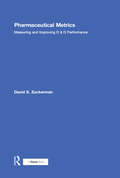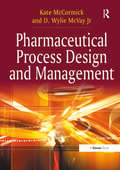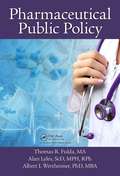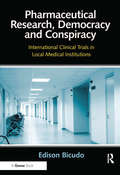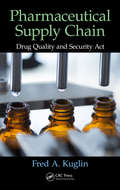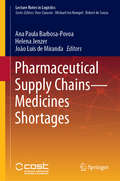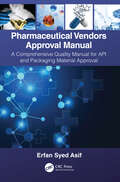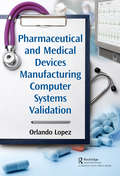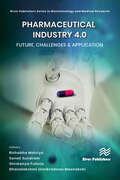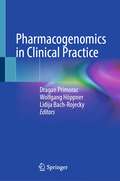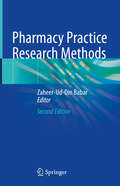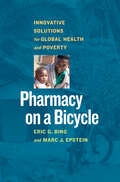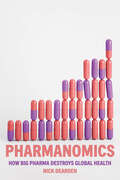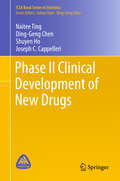- Table View
- List View
Pharmaceutical Industry: Challenges in the New Century
by James Weber Stephen P. BradleyProvides a broad overview of the numerous internal and external forces that were driving change in the global pharmaceutical industry in 2003. These forces--including downward price pressures, political and social pressures, increased development costs, new technologies, new and different competitors, consolidation, and threats to its basic business models--were changing the way drugs were discovered, developed, manufactured, tested, regulated, marketed, sold, and purchased. A rewritten version of an earlier case.
Pharmaceutical Metrics: Measuring and Improving R & D Performance
by David S. Zuckerman'What gets measured gets fixed' and this is as true of the pharmaceutical industry as any other. The problem is that pharmaceutical businesses are complex. Drug research and development involves extended and expensive processes; defining appropriate metrics for these processes is not easy, yet ineffective or misguided metrics can be more damaging than none at all. David Zuckerman's Pharmaceutical Metrics is an extremely practical guide to selecting a system, selling it to top management, choosing and defining the right metrics for your system, communicating and displaying the results. And because metrics are about how to shape and develop your business, he explores how to deploy them organization-wide and make sure that they are driving business improvement. In order to reflect the needs of different types of pharmaceutical company the author uses four sample companies, throughout the book, to illustrate the principles for 'big pharma', 'micro pharma', a virtual development company and a CRO. This highly practical book provides a step-by-step guide to creating a state-of-the-art, strategy-driven metrics system for pharmaceutical R&D, supported by case studies of the techniques applied and tips for optimizing the system.
Pharmaceutical Process Design and Management
by Kate McCormick D. Wylie JrA quality product or service is the successful and profitable outcome of organising resources, as judged by the final customer. Every business unit needs processes in order to do this effectively; and all processes must be documented so that achievements can be measured and future improvements planned and implemented. Pharmaceutical Process Design and Management takes a step-wise approach to process management. It presents the various elements comprising a process (man, machine, materials, method and environment); it looks at quality control and quality assurance, tools for quality improvements and ways of structuring a process into discrete, fully accountable elements; it proposes that for processes to run successfully, all operators must be the initial problem-solvers; finally, it illustrates how, with the right tools, every problem can be broken down into solvable elements. Learn how to deploy a science and risk-based approach to pharmaceutical manufacturing, by taking a fundamental approach to process design and management and, as a consequence, keep your customers satisfied and your profits healthy.
Pharmaceutical Public Policy
by Thomas R. Fulda Alan Lyles Albert I WertheimerAs the most common health-care intervention, prescription drug use shares the most important characteristics of the health-care system in the United States. When everything works well, it makes possible breathtakingly successful applications of science to the prevention and cure of human suffering. But everything doesn‘t always work well. Pharmaceu
Pharmaceutical Research, Democracy and Conspiracy: International Clinical Trials in Local Medical Institutions
by Edison BicudoClinical trials used to be conducted overwhelmingly in the US and Europe but for a range of economic, technical and ethical reasons, the number of multicentre studies recruiting subjects in different regions of the World has grown exponentially. New medicines are tested in vast research networks involving several countries, hospitals and other medical institutions, and hundreds of individual subjects. In Pharmaceutical Research, Democracy and Conspiracy, Edison Bicudo examines the connections between global and local scales, exploring how it is possible for social actors as different as global companies and patients of local hospitals to come together and establish social relationships that may last many years. He also identifies the implications of these global-local relationships for the financial, technical and cultural structures of the participating hospitals. His study draws on fieldwork conducted in five countries: the UK, Spain, France, Brazil and South Africa. Shining a light on the social mediations that enable the encounter between these rationalities, the author concludes that this has the practical effect of subjecting countries hosting trials to institutional engineering. Hospitals and research agencies create new, sometimes surprising, institutional arrangements to cope with international research projects, which change relations between physicians and patients, as they acquire new roles as clinical investigators and research subjects. Frequently, such shifts deviate the institutional structures of medical institutions away from democratic, and towards conspiratorial, schemes. The book reviews the concept of mediation in sociological thought, proposes further developments in Habermas’ theory of communicative action, and offers some political reflection about the role of institutions in contemporary democracies.
Pharmaceutical Supply Chain: Drug Quality and Security Act
by Fred A. KuglinError-proofing in the production process of pharmaceuticals isn‘t just a matter of good business, it has life-and-death implications for consumers. To that end, the 2013 Drug Quality and Security Act in large part requires new mandates on tracking and tracing chain of custody in the supply chain. Pharmaceutical Supply Chain: Drug Quality and Securi
Pharmaceutical Supply Chains - Medicines Shortages (Lecture Notes in Logistics)
by João Luís de Miranda Ana Paula Barbosa-Povoa Helena JenzerThis book provides an insight of relevant case studies and updated practices in “PharmaceuticalSupply Chains” (PharmSC) while addressing the most relevant topics within the COST Action “Medicines Shortages” (CA15105).The volume focuses on the most recent developments in the design, planning and scheduling ofPharmSC, broadening from the suppliers’ selection to the impact on patients and healthcaresystems, addressing uncertainty and risk mitigation, and computational issues. It is directed at MSc/PhD students and young researchers (Post-Docs) in Pharmaceutics/Pharmaceutical sciences, Engineering fields, Economics/Management, as well as pharmaceutical decision makers, managers, and practitioners, and advanced readers demanding a fresh approach to decision making for PharmSC. The contributed chapters are associated with the homonymous COST Training Schools (TS), and the book creates a better understanding of the Action “Medicines Shortages” challenges and opportunities.
Pharmaceutical Vendors Approval Manual: A Comprehensive Quality Manual for API and Packaging Material Approval
by Erfan Syed AsifThis book provides stepwise guidance on how to evaluate, audit, qualify and approve an active pharmaceutical ingredient (API) and packaging material manufacturer and supplier to enhance the GMP within the industry. The book will also be beneficial for institutions conducting pharmaceutical technology courses in terms of GMP and GLP applications. The Pharmaceutical Vendors Approval Manual provides readers and front-line health care products manufacturers, R&D management and biotech laboratories all the information they need to know to develop a GMP-oriented industry with trained and skilled personnel and manufacture products that meet GMP and regulatory requirements. This book provides a simple, concise and easy to use reference tool covering basic quality concepts and the elements of vendor’s assessment, qualification and approval required by the pharmaceutical educational institutions and professional certification bodies. It is equally relevant to Quality Assurance officers, Quality Control Analysts, Quality Auditors and other personnel involved in GMP/GLP services in the company. The book will also be beneficial for the institutions conducting Pharmaceutical technology study courses in terms of GMP and GLP applications. This book provides readers and front-line health care products manufacturers, R&D management and biotech laboratories all the information they need to know to develop a GMP-oriented industry with trained and skilled personnel and manufacture products that meet GMP and regulatory requirements covers basic quality concepts and the elements of vendor’s assessment, qualification and approval required by the pharmaceutical educational institutions and professional certification bodies provides stepwise guidance on how to evaluate, audit, qualify and approve an API and packaging material manufacturer and supplier to enhance the GMP within the industry provides ready to use regulatory documentation, e.g. letter of commitment, questionnaire, SOP, etc. required for API and Packaging Materials contract Provided material can be easily tailored to incorporate changes to add in-house vendor’s qualification requirements. Erfan Syed Asif, Ph.D is a Senior Consultant at PharmEng Technology.
Pharmaceutical and Medical Devices Manufacturing Computer Systems Validation
by Orlando LopezValidation of computer systems is the process that assures the formal assessment and report of quality and performance measures for all the life-cycle stages of software and system development, its implementation, qualification and acceptance, operation, modification, requalification, maintenance and retirement (PICS CSV PI 011-3). It is a process that demonstrates the compliance of computer systems functional and non-functional requirements, data integrity, regulated company procedures and safety requirements, industry standards, and applicable regulatory authority’s requirements. Compliance is a state of being in adherence to application-related standards or conventions or regulations in laws and similar prescriptions. This book, which is relevant to the pharmaceutical and medical devices regulated operations, provides practical information to assist in the computer validation to production systems, while highlighting and efficiently integrating worldwide regulation into the subject. A practical approach is presented to increase efficiency and to ensure that the validation of computer systems is correctly achieved.
Pharmaceutical industry 4.0: Future, Challenges & Application (River Publishers Series in Biotechnology and Medical Research)
by Rishabha Malviya Sonali Sundram Shivkanya Fuloria Dhanalekshmi Unnikrishnan MeenakshiThe pharmaceutical industry is on the cusp of a new age, with the need for personalized therapy, more complex production processes, smaller batch sizes and rising manufacturing costs. It is necessary to continuously adapt to the rapidly changing environment using novel technology and improved operational efficiency and flexibility. To achieve this, intelligent manufacturing seems to be a definite answer. Pharma 4.0 is a framework for adapting digital strategies to the unique contexts of pharmaceutical manufacturing. This book provides a deep insight into key technologies that will modernize pharmaceutical manufacturing and facilitate digital transformation. Throughout the book we discuss technologies, application and challenges for applying digital technology in pharmaceutical industry, including: • Focus on an overview of Industry 4.0 and its application in the pharmaceutical field • Most recent advances in the pharmaceutical industry • Understanding the concepts of emerging technology trends for drug discovery.
Pharmacogenomics in Clinical Practice
by Dragan Primorac Wolfgang Höppner Lidija Bach-RojeckyThis book provides a practically applicable guide to the applications of pharmogenomics across medicine. Background information is provided on the mechanisms associated with membrane transporters, drug-metabolizing enzymes and their importance in pharmagenomics. Detailed guidance is subsequently presented on how to apply these techniques in disciplines including cardiology, gastroenterology, oncology, transplantation surgery, infectious diseases, anesthesia and analgesia, neurology, psychiatry, primary care, and public health. Clear easy-to-follow instructions are given on how to use big data technologies and public health databases in day-to-day clinical practice. Pharmacogenomics in Clinical Practice concisely covers how pharmacogenomic technologies and techniques can be applied in daily medical practice. It is therefore an ideal up-to-date resource for any medical practitioner, trainee or researcher across all medical disciplines who want to better understand how to use these techniques.
Pharmacy Practice Research Methods
by Zaheer-Ud-Din BabarThe first edition of Pharmacy Practice Research Methods provided a contemporary overview of pharmacy practice research, discussing relevant theories, methodologies, models and techniques. It included chapters on a range of quantitative, qualitative, action research and mixed methods as well as management theories underpinning change in pharmacy practice.This new edition of the book is much broader and more diversified. It includes the quality improvement methods in pharmacy practice research, focusing on the key differences between high and low-income countries with regard to pharmacy practice research, as well as the main challenges faced when conducting such research – areas of significant global interest. In addition, a number of the chapters covering fast-moving fields where new methods have been developed and published have been updated. Featuring seven new topics and presenting future trends, the book also explains in detail methods used in covert and overt observations in pharmacy practice, as well as methods involved in realist research, which are important to countries seeking to produce evidence-based information in this area.
Pharmacy Service Improvement at CVS (A)
by Andrew McafeeCVS's retail pharmacy operations are functioning poorly and dissatisfying customers. Many customers are defecting as a result. A pharmacy service improvement team has documented the current prescription fulfillment process, its exception rates, and the problems generated by exceptions. The company must now decide how to change this process, and what information system changes to make in support of the redesigned process.
Pharmacy Service Improvement at CVS (B)
by Andrew McAfeeAn abstract is not available for this product.
Pharmacy Service Improvement at CVS (B)
by Andrew McafeeAn abstract is not available for this product.
Pharmacy on a Bicycle: Innovative Solutions for Global Health and Poverty
by Marc J. Epstein Eric G. BingEvery four minutes, over 50 children under the age of five die. In the same four minutes, 2 mothers lose their lives in childbirth. Every year, malaria kills nearly 1.2 million people, despite the fact that it can be prevented with a mosquito net and treated for less than $1.50.Sadly, this list goes on and on. Millions are dying from diseases that we can easily and inexpensively prevent, diagnose, and treat. Why? Because even though we know exactly what people need, we just can’t get it to them. They are dying not because we can’t solve a medical problem but because we can’t solve a logistics problem. In this profoundly important book, Eric G. Bing and Marc J. Epstein lay out a solution: a new kind of bottom-up health care that is delivered at the source. We need microclinics, micropharmacies, and microentrepreneurs located in the remote, hard-to-reach communities they serve. By building a new model that “scales down” to train and incentivize all kinds of health-care providers in their own villages and towns, we can create an army of on-site professionals who can prevent tragedy at a fraction of the cost of top-down bureaucratic programs. Bing and Epstein have seen the model work, and they provide example after example of the extraordinary results it has achieved in Africa, Asia, and Latin America. This is a book about taking health care the last mile—sometimes literally—to prevent widespread, unnecessary, and easily avoided death and suffering. Pharmacy on a Bicycle shows how the same forces of innovation and entrepreneurship that work in first-world business cultures can be unleashed to save the lives of millions.
Pharmacyclics: Financing Research & Development
by Aldo Sesia Richard S. Ruback Malcolm P. BakerPharmacyclics (NASDAQ: PCYC), a pharmaceutical company that manufactures products that will improve existing therapeutic treatments for cancer, arteriosclerosis, and retinal disease, was considering a $60 million private placement in February 2000. The company had more cash than ever before, but projections of R&D and marketing expenses were also unprecedented. PCYC's most promising oncology drug, a radiation enhancer called Xcytrin, was in Phase III clinical trials--the rigorous final phase before FDA approval for commercialization. Analysts gave the drug a slightly better than 50% chance of success. This case focuses on stage financing and a simple decision-tree evaluation. Students have the opportunity to consider the impact of past staged financing decisions on the ownership structure of the firm and to evaluate the current stock market price in light of analyst forecasts of the cash flow and the probability of success for each drug. These two analyses help inform the private placement decision.
Pharmanomics: How Big Pharma Destroys Global Health
by Nick DeardenInvestigative journalist Nick Dearden digs down into the way we produce our medicines and finds that Big Pharma is failing us, with catastrophic consequences.Big Pharma is more interested in profit than health. This was made clear as governments rushed to produce vaccines during the Covid pandemic. Behind the much-trumpeted scientific breakthroughs, major companies found new ways of gouging billions from governments in the West while abandoning the Global South. But this is only the latest episode in a long history of financialising medicine—from Purdue&’s rapacious marketing of highly addictive OxyContin through Martin Shkreli&’s hiking the price of a lifesaving drug to the 4.5 million South Africans needlessly deprived of HIV/AIDS medication. Since the 1990s, Big Pharma has gone out of its way to protect its property through the patent system. As a result, the business has focused not on researching new medicines but on building monopolies. This system has helped restructure our economy away from invention and production in order to benefit financial markets. It has fundamentally reshaped the relationship between richer and poorer countries, as the access to new medicines and the permission to manufacture them is ruthlessly policed. In response, Dearden offers a pathway to a fairer, safer system for all.
Phase 1: Diagnosing the Patient--Rapid Transformation
by Jill Avery Sunil Gupta Behnam TabriziDiagnosis of an organization's underlying issues is the most important phase in the transformation process. This chapter outlines the process and methodology for a successful diagnosis, providing rapid response teams with tools and examples of key areas to analyze.
Phase 2: Envisioning the Future--Rapid Transformation
by Behnam TabriziOnce rapid response teams have identified the major pain points for the organization, it is time for the teams to shift their focus and start looking at solutions for these problems. This chapter lays out this part of the transformation process, looking at how teams work to identify various alternatives for treatment and remedy.
Phase 3: Paving the Road--Rapid Transformation
by Behnam TabriziIn the final planning stage of a transformation effort, rapid response teams must plant the seeds and pave the road for a successful implementation. This chapter discusses how these teams, who have diagnosed the organization's major pain points and generated creative solutions, must now develop a transformation implementation plan.
Phase II Clinical Development of New Drugs
by Naitee Ting Ding-Geng Chen Shuyen Ho Joseph C. CappelleriThis book focuses on how to appropriately plan and develop a Phase II program, and how to design Phase II clinical trials and analyze their data. It provides a comprehensive overview of the entire drug development process and highlights key questions that need to be addressed for the successful execution of Phase II, so as to increase its success in Phase III and for drug approval. Lastly it warns project team members of the common potential pitfalls and offers tips on how to avoid them.
Phase Two: The Pharmaceutical Industry Responds to AIDS
by Debora L. Spar Nicholas BartlettDescribes how major pharmaceutical firms changed their strategy and pricing policies in the years 2000 to 2002 to respond to the growing AIDS epidemic in Africa.
Phase Zero: Introducing New Services at IDEO (A)
by Amy C. Edmondson Laura R. FeldmanFocuses on whether world-renowned product design firm IDEO's new customer service fits with the firm's strategic position and organization capabilities. Over the course of IDEO's 13-year history, an increasing share of revenues are a result of "Phase 0" projects--preliminary strategic explorations of future product possibilities for various client firms. Describes a specific Phase 0 project in order to explore the challenge of managing these strategic, intangible services in the context of IDEO's successful history of generating award-winning tangible product designs. A team at IDEO's Boston office worked with mattress manufacturer Simmons to discover unmet customer needs and identify new product line opportunities. Describes the challenges and questions facing the Simmons project team as well as critical and operational questions facing IDEO. Examines these issues through the eyes of the head of the Boston office, who wonders how to evaluate Phase 0 projects.
Phase Zero: Introducing New Services at IDEO (B)
by Amy C. Edmondson Kathryn S. RoloffAn abstract is not available for this product.

